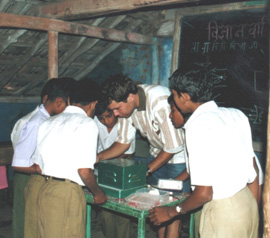Externship Report
by Thilo Elsaesser
email: thilo.elsaesser@gmx.de

Before I came to Pune to work with Vidnyanvahini as an extern, I knew what the expression "remote area" means. But I literally had to redefine it after I spent a couple of weeks with the MSL. It is not just the distance to major cities-which is not that much, only the road conditions that make them appear very far-but also the lack of infrastructure and education, that makes Indian villages appear so far away from civilization. Not many people from the cities with a good educational and financial background are ever exposed to these areas, although this is where 70% of the Indians live. Fortunately, I had the opportunity to meet quite a few different women and men who devote time to the MSL and work to bridge the gap between rich and poor, educated and illiterate, city and village people. There are many ways of improving the situation for the disadvantaged rural people and there are many paths to be taken. The Vidnyanvahini's MSL focuses on education in science for eighth to tenth standard students in mostly unaided schools in Maharashtra. They enhance awareness of science among the students and motivate them to develop further interest in these subjects. Especially in Biology, Chemistry and Physics, the lack of funding for village schools has drastic consequences. How can you learn about electromagnetism without having ever seen Faraday's law demonstrated by an experiment, or believe in cells without ever seeing them under a microscope? The DAG (Dialogue and Action Group) of Vidnyanvahini brings experiments in these subjects in a specially designed bus with them to show them to the students in small schools. On the one hand the kids are very eager to learn and see the experiments, but on the other hand their shyness (especially the girls), hinders them from developing their full potential. The basic knowledge of the students in Mathematics, Science, and English language is very poor. It is perhaps due to the poor knowledge and missing motivation of the teachers. There are exceptions but in general teachers are not capable to transfer the needed knowledge. Moreover the list of reasons for the poor situation seems to be endless: little or no funds, poor teachers' training, no lab equipment, corruption, lack of motivation, little awareness among farmers of the importance of education, child marriages, and so on.
The MSL on this background comes along with very motivated, well-educated and committed teachers who have facilities to teach the disadvantaged kids. During one school year, they make more than 130 visits to various schools and reach about 10,000 students. The volunteers of the DAG, who are mainly retired persons, could serve as very good examples for the village teachers as to how they can improve their class lessons. Unfortunately, some teachers regard Vidnyanvahini's visit as a holiday instead of studying MSL's activities for their benefit. To overcome these problems Vidnyanvahini organizes teachers' workshops. Another activity is the exhibition camp performed at larger schools. At such camps, MSL teachers explain some experiments to the 10th standard students who in turn explain them to the rest of the kids. This is a very novel way to give students a more active role. Vidnyanvahini also publishes and sells at a nominal price a science magazine for teachers and students. Some schools also get the benefit of a mobile library.
I had a very good time at Vidnyanvahini. I was heartily welcomed by all members of the group. I was even invited to the houses of most of them, which I enjoyed very much. I would like to specially mention Ashok Rupner, a full-time teacher, and Mukund Bhadbhade, a volunteer with the DAG. They let me stay at their places for six weeks in total, showed me around the city and introduced me to their families. I profited from my externship with the MSL quite a lot. Not only could I see Indian villages in depth and study their problems, but I also experienced the friendliness and curiosity of the students and it was a lot of fun for me teaching them. Although I did not know Marathi well, I could tell how much people appreciated my attempt to learn and had fun listening to my struggle with Marathi words. I taught optics to the students in Marathi with effort. But for computer literacy, I taught in English while another teacher like Shambhavi Bhide or a local teacher patiently translated me. I think this was a nice way to involve the teachers in the MSL activity. Sometimes I was aware that I was representing Europe to the rural kids who had never seen a white-skinned person like me before. After getting rid of their shyness, students often asked me good questions about Germany. I would sometimes shock them about some European customs or amuse them by teaching some German words.
At the end, I was wondering if after collecting a good sample of different schools, the MSL could consider focusing on fewer schools to enhance the impact of the excellent work they are doing. In many schools there are some lazy teachers and one visit per semester may not be so effective. But if the number of schools is reduced to ten or twenty per year, with interested teachers, these schools could serve as good examples for the others.
I was very impressed by the enthusiasm and devotion of Mrs. and Dr. Deshpande who have founded and lead Vidnyanvahini together with Mr. Jayant Phalke. They and all members of the DAG show a sense of responsibility and commitment which will lead India towards a better future. Last but not least, I thank all my friends at Vidnyanvahini who made my stay so fruitful and enjoyable.

